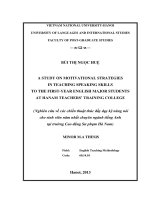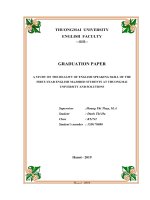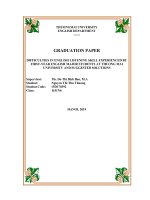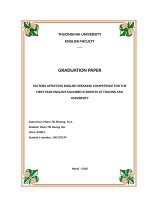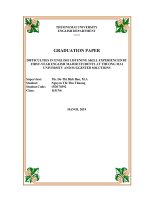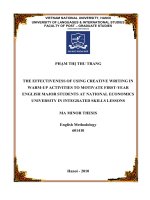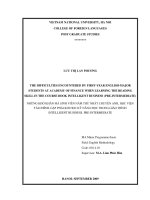Difficulties in online speaking lessons encountered by first year english majored students at hung vuong university
Bạn đang xem bản rút gọn của tài liệu. Xem và tải ngay bản đầy đủ của tài liệu tại đây (650.83 KB, 73 trang )
HUNG VUONG UNIVERSITY
DEPARTMENT OF FOREIGN LANGUAGES
KHONG THANH HIEN
DIFFICULTIES IN ONLINE SPEAKING LESSONS
ENCOUNTERED BY FIRST YEAR ENGLISH MAJORED
STUDENTS AT HUNG VUONG UNIVERSITY.
B.A. GRADUATION PAPER
Field: English Methodology
Supervisor: Dr. HOANG THI VAN YEN
ACKNOWLEDGEMENTS
As a student of the Faculty of Foreign Languages at Hung Vuong University, I
would like to thank the school for fully supporting me in all aspects of my
dissertation process.
First of all, I would like to express my deepest thanks to my supervisor Dr.
Hoang Thi Van Yen, for pieces of useful advice and guidance during the thesis
process, she contributed numerous interesting ideas and substantial helpful
corrections for my graduation paper. Without her guidance and persistent
assistance, this dissertation would not have been possible.
Besides, I am very grateful to all the teachers at the Faculty of Foreign
Languages, at Hung Vuong University who have provided me with useful
knowledge throughout the 4 years, which has helped me built up a firm
foundation and gave me immense ideas for the fulfillment of this dissertation.
Next, I am also grateful to my friends from K16 English Pedagogy at Hung
Vuong University, who have accompanied me throughout the 4 years study
period and encouraged me throughout this research process.
Also, I would like to give my heartfelt thanks to the first year English major
students at Hung Vuong University, who enthusiastically participated in my
thesis and shared with me interesting stories during the interviews.
Last but not least, I am extremely grateful to my beloved family for taking care
of me and encouraging me to complete the thesis in the best way.
ABSTRACT
Speaking skill is considered as one of the most important skills for English as a
Foreign Language (EFL) learners in daily communicative activities. However, it
is a demanding skill for many EFL learners, especially those living in contexts
where they have few opportunities to practise speaking in various contexts. With
the outbreak of the Covid-19 pandamic, online learning has become a popular
learning platform for many university students. Nevertheless, this can cause
some difficulties for students when learning speaking skill as they have less
direct contact with teachers and peers. Given the importance of speaking skill
and the difficulties that it may pose for first-year EFL learners, it is necessary to
achieve a deeper insights into this topic in order to provide students with
appropriate suppport in virtual classes.
Therefore, this study aims to explore difficulties met by first year English major
students at Hung Vuong University when learning speaking skill online and their
attempts to improve this skill. Based on the results of this study, the researchers
found that students expressed their attitude towards learning speaking skills
online in the Covid-19 pandemic when they had to cope with various problems
of technical issues and other difficulties related to speaking skill such as
mispronunciation, lack of spoken vocabulary, lack of grammar and lack of
confidence as well. Thus, students attempted to overcome those problems by
finding a good wireless network, fixing problems with gadgets and platforms
used during online classes. Besides, they also applied other solutions such as
finding friends to practice with, thinking in English, building confidence,
expanding their vocabulary, and improving pronunciation. Based on the findings,
the study made some suggestions to support teachers and students in learning
speaking skill online.
TABLES OF CONTENTS
Acknowledgements
Abstract
Table of contents
PART 1: INTRODUCTION……………………………………………………..1
1.1. Rationale…………………………………………………………………….1
1.2. Research questions…………………………………………………………..2
1.3. The significance of the study………………………………………………..3
1.4. Scope of the study…………………………………………………………...3
1.5. Organization of the study……………………………………………………3
PART 2: CONTENT……………………………………………………………..5
CHAPTER 1: LITERATURE REVIEW………………………………………...5
1.1. Definitions of speaking skill………………………………………………...5
1.2. The importance of speaking skill……………………………………………7
1.3. Factors affecting speaking skill…………………………………………….10
1.3.1. Listening comprehension………………………………………………...10
1.3.2. Grammatical accuracy……………………………………………………11
1.3.3. Pronunciation…………………………………………………………….12
1.3.4. Vocabulary……………………………………………………………….13
1.3.5. Feedback during activities……………………………………………….15
1.3.6. Organization of ideas…………………………………………………….15
1.4. English speaking problems encountered by English as a Foreign Language
(EFL) students…………………………………………………………………..15
1.4.1. Previous research in the world…………………………………………...16
1.4.1.1. Vocabulary and grammar………………………………………………16
1.4.1.2. Pronunciation…………………………………………………………..17
1.4.1.3. Listening comprehension………………………………………………18
1.4.1.4. Lack of ideas…………………………………………………………...18
1.4.1.5. Lack of speaking curriculum…………………………………………..19
1.4.1.6. Lack of confidence ……………………………………………………20
1.4.1.7. Mode of learning………………………………………………………20
1.4.2. Previous research in Vietnam…………………………………………...21
CHAPTER 2: RESEARCH METHODOLOGY…………………………...…..24
2.1. The context of study……………………………………………………….24
2.1.1. Hung Vuong University……………………………………………..…..24
2.1.2. Participants of the study……………………………………………..…..24
2.2. Data collection instruments……………………………………………..…25
2.2.1. Questionnaire……………………………………………………….…...26
2.2.1.1. Reasons for using questionnaires……………………………………..26
2.2.1.2. Description of survey questionnaires…………………………………27
2.2.2. Interview………………………………………………………………...27
2.2.2.1. Reasons for using interview………………………………………......27
2.2.2.3. Description of interview………………………………………………..28
CHAPTER 3: FINDINGS AND DISCUSSION………………………………..30
3.1. Data collected from questionnaires……………………………………….. 30
3.2. Data collected from interview…………………………………………….. 33
3.2.1. Data collected from student‟s interview………………………………... 34
3.2.1.1. Students‟ speaking difficulties………………………………………... 34
3.2.1.2 Students‟ efforts to improve speaking skill……………………………. 38
3.2.2. Data collected from teacher‟s interview………………………………... 40
3.2.2.1. Students‟ speaking difficulties…………………………………………40
3.2.2.2. Teachers‟ efforts to help students with speaking……………………... 43
3.3. Discussion………………………………………………………………… 47
PART 3: CONCLUSION………………………………………………………50
4.1. A summary of the findings………………………………………………...50
4.2. Implications for teaching and learning English speaking skill…………….51
4.2.1 Some suggestions lectures………………………………………………..51
4.2.2. Some suggestions for university management and policy makers………53
4.2.3. Some suggestions for students…………………………………………...53
4.3. Limitations of the study……………………………………………………59
4.4. Suggestions for further studies…………………………………………… 60
REFERENCES
APPENDICES
1
PART 1: INTRODUCTION
1.1. Rationale
Nowadays, English has become a global language rather than the language of
only the English-Speaking countries as the UK and the US, which facilitates
international communication. English has been considered as one of the most
important languages to master in the world in general and in Viet Nam in
particular. For English as a Foreign Language (EFL) learners, speaking is a
significant skill to be developed in order to achieve effective communication.
Mastering speaking skills will enable students to communicate with English
native speakers and those coming from different parts of the world.
However, English speaking skill poses quite many problems for non-English
speaking students. Zhang (2009) argued that speaking remains the most difficult
skill to acquire for the majority of English learners, and they are still
incompetent in communicating orally in English. Many EFL students usually
find it difficult to speak English confidently. Although many students have good
knowledge of vocabulary and grammar rules, their communication skill is still
limited. Many students are afraid to speak English in English classes, especially
high school students. Therefore, when they go to the college, speaking skill still
remain as an obstacle for them, which is a concern for many teachers who teach
English speaking at university level.
With the ongoing global COVID-19 pandemic which began in early 2020
forcing the suspension of face to face classes at every level of education in most
countries around the world, English language teachers are having to find
alternative modes of teaching and interacting with their learners. Technological
advancements in recent years meant that teachers have more options, and online
lessons delivered through video-conference software are now a real possibility
2
and a diversity of applications and platforms are employed, including Google
Classroom, WhatsApp, Zoom Meeting. This learning mode refers to the ways of
online communication without the real-time participation between students and
instructors, and learning materials and learning resources are delivered via
Learning Management System (LMS) platform with many supportive tools such
as e-mails, discussion boards, blogs, wikis, or video/audio recordings. However,
this new teaching method can cause some difficulties for first year university
students who are more familiar with traditional class than virtual ones. They also
may find it more difficult to learn such demanding skill in an environment that is
supposed to have less direct contact with teachers and students from they can
find support from. However, there is limited scholarly attention to the problems
facing first year students when having to attend speaking classes online.
Given the significance of English speaking skill and the challenges it can pose to
first year EFL students, it is necessary to gain an understanding of this topic to
provide them with appropriate support and enhance their communicative skills.
Therefore, the researcher aims to conduct a research project entitled:
“Difficulties in online speaking lessons encountered by first year English
majored students at Hung Vuong University”. This study aims to find out the
difficulties that English language students meet when attending online English
speaking lessons and how they managed to overcome their problems.
1.2. Research questions
In order to fulfill the research aim, this study seeks to find out the answers to the
following questions:
1.2.1. What difficulties do the first year English major students at Hung Vuong
University meet when learning speaking skill online?
3
1.2.2. What have they done in an attempt to improve their English speaking
skill?
1.3. The significance of the study
This study was conducted in a small scale, with 3 groups of K19 English major
students at Faculty of Foreign Languages, Hung Vuong University, the
researcher hopes that the findings will provide an insight into the real situation of
learning English speaking online of this cohort of students. This understanding
will help lecturers of English speaking skills offer suitable support to help their
students improve their oral communication ability in online learning mode. The
study also benefit students as participation in interviews with the researcher
gives them an opportunity to reflect on their learning process and learn useful
tips to improve speaking skill from their peers. The findings of this study also
inform both university and faculty in issuing rules and regulations that support
students better when having to study communicative skills online.
1.4. Scope of the study
While English speaking skill plays a significant role in EFL students‟
communicative ability, the difficulties facing these students when learning
speaking online has not been fully understood yet. The aim of this study to
explore the problems met by those students in virtual speaking classes and their
attempts to improve this skill. The scope of this study is limited to recruiting 58
first year English-major students (K19) at Faculty of Foreign Languages where
the researcher is studying. These students are supposed to have additional
difficulties when learning this skill as they did not engage in English language
oral communication at lower education level and were not familiar with virtual
classes.
1.5. Organization of the study
4
The research consists of three parts:
PART 1: INTRODUCTION
This part presents the overview of the study, including the statement of the
problem, research questions, significance of the study, the scope of the research
as well as organization of the thesis.
PART 2: CONTENT
Chapter 1: Literature Review
This chapter review relevant studies and related concepts of the research. These
include the definitions of speaking skill, the importance of speaking, and factors
affecting EFL‟s speaking skill.
Chapter 2: Research Methodology
This chapter will give a detail account of the research methodology, including
research context, research participants, the procedures and tools involved in data
collection instruments, data analysis.
Chapter 3: Findings and Discussion
In this chapter, the researcher focuses on giving some major findings of the study
about the speaking difficulties that English Language Students have and what
they attempted to tackle their problems as well as discussion related to the
findings.
PART 3: CONCLUSION
This chapter gives a summary of the study, including a brief rationale of the
study, the conduct of the study, what the study found and presented implications
based on the findings. Limitations of the study and suggestions for future studies
are also given in this chapter.
5
PART 2: CONTENT
CHAPTER 1: LITERATURE REVIEW
In this chapter, the relevant literature is reviewed, including the importance of
speaking skill, the factors affecting learning English speaking, and problems
encountered by English as a Foreign Language (EFL) students when speaking in
English.
1.1. Definitions of speaking skill.
Speaking is the most effective and easiest means of communication to help
people understand each other. There are numerous definitions of speaking skill
that have been suggested by the researchers in the field of applied linguistics.
Speaking is “the process of making and sharing meaning by using verbal and
non-verbal symbols in a variety of contexts” (Chaney, 1998: P 13). Speaking is
an essential part of second language learning and teaching. Thus, for many years,
teaching speaking has been valued and much focus has been put on improving
NNES students‟ speaking skill.
Brown (1994) and Burns and Joyce (1997) also shared the same view. They
considered speaking as an interactive process of making meaning that included
producing, receiving, and processing information. Its form and meaning are
dependent on the context in which it occurs, including the participants
themselves, their collective experiences, the physical environment, and the
purposes for speaking, which is often spontaneous, open-ended, and involving.
Meanwhile, Wilson (1983) stated that speaking was the development in term of
relationship between the speaker and the listener. It is necessary to determine the
rules of language in the field of logic, psychology and physics to be applied in a
certain communication situation. To gain the effective in communication, the
6
speaker must know exactly what he or she want to say. In other words, speaking
is the activity that helps speakers transfer information and maintain the
relationship. Learners are required to not only learn how to produce specific
points of language such as grammar and vocabulary, but also when, why and in
what ways language is produced.
Valette (2003) supported the view of speaking as interactional skills that involve
making decision about communication. This is considered as a top-down view of
speaking. This top-down view regards the collaboration between two or more
persons in the shared time and the shared context. Thus, the advocate of this
opinion suggests that, rather than teaching learners to make well-formed
sentences and then putting these to use in conversation, English teachers should
encourage learners to take part in spoken discourse from the beginning and then
they will acquire the smaller units.
On the other hand, Jones (1989) defines speaking as a form of communication in
which the effective conveyance of what the speaker says is very crucial. In line
with this definition, Kush (2005) stated that effective speaking is an utterance in
a set of voices spoken by someone and understood by someone else. It means
that speaking is not as simple as we say something but more than that, it is
related to the meaning that is constructed so that people can understand what we
are saying.
Having different access to English speaking skill, Hedge (2000, p 15) stated that
speaking is a skill “by which people were judged while first impressions were
being formed”. Speaking can be considered as an important factor to reflect
people‟s personalities and thoughts. Besides, reviewing previous research related
to defining speaking, it was noticed that those two main approaches are adopted
to define speaking, bottom-up and the top down approach
7
Another viewpoint of speaking is that speaking is a multi-sensory activity
because it involves paralinguistic features such as eye-contact, facial
expressions, body language, tempo, pauses, voice quality changes, and pitch
variation which affect conversational flow (Thornbury, 2005, p.9). It seems that
culture is integral in how speaking is constructed which has implications for how
English speaking is taught and learned.
To sum up, speaking skill itself can be stated as a skill to use the language
accurately to express meanings in order to transfer or to get knowledge and
information from other people in the whole life situation. The highest level of
speaking skill is ability to speak fluently, appropriately and understandably every
time, everywhere and in every situation. In this study, the researcher would rely
on some definitions of English speaking skill to develop the research topic, such
as “Speaking is one of the most important and essential skills that must be
practiced to communicate orally” (Casilli, 2013). In fact, the people who have
ability in speaking will be better in sending and receiving information or
message to another. Thus, speaking is the process of building and sharing
meaning through the uses of verbal and nonverbal symbol in various contexts.
Moreover, speaking is an interactive process of constructing meaning that
involves producing, receiving and processing information. Its form and meaning
are depending on the context in which it occurs, including the participants
themselves, their experiences, the physical environment, and the purposes for
speaking (Kennet, 2015).
1.2. The importance of speaking skill.
In the present global world, communication plays a vital role in getting success
in all fields. Language is used as a tool for communication. Perfect
communication is not possible for people without using a language. Moreover,
8
people cannot achieve their aims, objectives, and goals without using proper
language to communicate. Therefore, there is a need for a language to
communicate with others those who live all around the globe. As English is
considered the international language and it is spoken all over the world, it
serves the purpose of communicating with the people who live in different
regions, states, countries, and continents of the world.
Speaking, along with other three skills such as reading, listening and writing,
helps learners learn a language effectively. Good speaking skills help people
communicate effectively. Therefore, many English language educators approve
improving speaking skills for EFL students. There are several reasons why
speaking skill is important.
Language is a tool for communication. We communicate with others to express
our ideas and to know others‟ ideas as well. According to Ur (2000), of all the
four language skills (listening, speaking, reading, and writing), speaking is the
most important one that is very necessary for the effective communication. An
effective speaker can gain the attention of the audience and hold it till the
completion of his message. English is an international language, so the ability of
using English in communication is necessary. In addition, speaking is the fastest
way to exchange information, therefore, more and more people are trying to
learn English speaking skill to communicate in modern life. This tendency may
put speaking in the highest position among all four language skills.
Furthermore, speaking skill is the most important skill to acquire foreign or
second language learning. Among the four key language skills, speaking is
deemed to be the most important skill in learning a foreign or second language.
Brown and Yuke (1983) say, “Speaking is the skill that the students will be
judged upon most in real life situations”. When students learn English, speaking
9
is significant to support their ability to apply the language. Speaking skill has
been very important to the success of human beings.
In addition, the significance of speaking skill is observed in the daily activities
of persons. Speaking is an interactive activity and it occurs under the real time
constraints. That is, persons can use words and phrases fluently without very
much conscious thinking. Byrne, D. (1976) said that all four language skills,
speaking skill is one of the most important and essential skill that must be
practice to communicate orally. The people who are good at speaking are those
who master not only grammar, pronunciation, intonation, vocabulary but also the
social context in which language is used. Speaking skill enables individuals to
produce sentences for the real communication, in other words, to communicate
in order to get specific objectives (McDonough & Shaw, 1993).
Some others consider speaking as vital outside the classroom. Therefore,
language speakers have more opportunities to find jobs in different organizations
and companies. In other words, speaking skills is the most essential skill for all
the learners who wish to learn English to enhance their career, improve business,
secure better job opportunities and so on. In modern world, most of activities
involve speaking skill, hence having good English communication skill is key to
get better employment opportunities. Baker and Westrup (2003) argue that
learners who speak English very well can have greater chance for better
education, better jobs, and promotion. Speaking skills are important for career
success, but certainly not limited to one‟s professional aspirations. Speaking
skills can also enhance one‟s personal life.
On the other hand, speaking is considered as a meaningful source of motivation.
According to Hornby (2010), speaking helps us express or communicate
opinions, feelings, ideas, etc, by or as talking and it involves the activities in the
10
part of speaker as psychological, physiological and physical stage. Teaching
speaking skill makes lessons more interesting. Teaching speaking skill brings
about a distinguished classroom atmosphere. It attracts all learners‟ interests.
Moreover, it urges them to be more active in the classroom activities, and it
makes the lesson more interesting.
To sum up, in the present modern world, everything is linked with speaking
skills. The researcher summarizes the importance of speaking skill as follow:
Firstly, speaking is a communication tool to communicate with others, to express
our ideas, and to know others‟ ideas as well. Secondly, speaking skills are
important to achieve the career success, one who has good talent in speaking can
conquer the whole world. Having good communication is the passport to get
better employment opportunities. Thirdly, speaking to the public gives speakers
the power to influence people and shape their decision (Griffin, 2008: 19).
Finally, speaking is a helpful teaching medium for teacher to motivate and
interest students in learning English.
1.3. Factors affecting speaking skill
1.3.1. Listening comprehension
Listening plays an extremely important role in the development of speaking
abilities. Speaking is closely connected with listening skills. Usually, one person
speaks and the other response through attending by means of the listening
process. In fact, during the interaction, every speaker plays a dual role- both as a
listener and a speaker. If one cannot understand what is said, one is certainly
unable to respond (Graham D. Bodie, Christopher C. Gearhart, Jonathan P.
Denham, Andrea J. Vickery, 2013)
According to Sharon (2020), being unable to hear correctly is one of the many
reasons for misunderstanding of what the speaker is trying to communicate. This
11
inability to hear is often the result of prejudice. In contrast, to avoid
misunderstanding, always clarify with the speaker to ensure that you have
understood correctly. Also, try to avoid conversations in noisy surroundings
(Hoang Tuan & Ngoc Mai, 2015). It is stated that the surroundings eliminate the
source of noise whenever possible; turn off cell phones, radios or television sets.
Moreover, according to Bozorgian (2012), He investigated the relationship
between listening skill and the other language skills. The results revealed that
there is a close correlation between listening comprehension and language
proficiency. That is, the higher the listening score, the better the speaking score.
Speaking skills cannot be developed unless we develop listening skills (Doff,
1998 as cited in Tuan & Mai, 2015). Students must understand what is said to
them to have a successful conversation. Speakers have the role of both listeners
and speakers. Similarly, English language learners are not able to reply if they
cannot comprehend what is told. That is to say, speaking is very closely related
to listening.
1.3.2. Grammatical accuracy
There are many types of grammar difficulties faced by students in an ESL/EFL
context. In learning grammar, three areas have to be considered: grammar as
rules, grammar as form, and grammar as resource. However, a better approach is
perhaps to see grammar as one of many resources that we have in language
which helps us to communicate. EFL learners should have the knowledge of
words and sentences. They should comprehend how words are divided into
different sounds and how sentences are stressed in specific ways. Grammatical
competence can help speakers apply and perceive the structure of English
language correctly that leads to their fluency (Latha, 2012).
12
According to Kenworthy (1987), some people wondered why there is a need to
have grammatical accuracy in English, when even some native English speakers
commited grammatical mistakes themselves. Let‟s pay attention to how both
(native English speakers and non-native English speakers) express their
thoughts. Native English speakers can say what they want without much
difficulty and express a certain concept/thought in a certain way, they can just
use other ways of saying those things. They may commit some mistakes in
grammar, but the mistakes do not distort or change the meaning of the sentences
they want to convey, thus, it doesn‟t give the listener much of a problem
understanding them. On the other hand, the mistakes many non- native speakers
of English commit are those that often change the meaning of the sentences they
want to express, and thus create a misunderstanding. This explains the reason
why non-native speakers have to study grammar much more than native
speakers.
1.3.3. Pronunciation
Pronunciation is the act of the way in which language or words are spoken in
communication. Clear pronunciation is very important in oral communication, so
that the native speakers and listeners are comfortable when they get involved in
communication. Hornby (1995) explains that “Pronunciation is the way in which
a language is spoken, the way in which a word is pronounced or the way a
person speaks the words of language”. Pronunciation is very important for
people when speaking English well. According to Harmer (2001) “He
emphasizes that if intelligibility is the goal, then it suggests that some
pronunciation features to emphasize segmental and suprasegmental are more
important”.
13
As we know, English is not a phonetic language. That is, pronunciation of
English words is not similar to their spellings. Words with similar spellings are
sometimes pronounced differently because of their surrounding contexts like
tenses and phonemes that come after them. This can cause a lot of problems for
non -native speakers of English and they sometimes get confused in producing
the English words. According to Kenworthy (1987) there are two types, vowels
and consonant. Vowels and consonant perform different functions in the syllable.
Each syllable has a vowel at it Centre (salt, tab-, etc.) and the consonant surround
the vowel, preceding it and cutting it. Various aspect of pronunciation” (p.9 –
11). He also stated (2009) that aspect of pronunciation included weak form, word
stress, main stress, intonation, word linking, word combination, sound insertion,
and sound deletion.
Nowadays, the fact in the classroom, students need teacher to be better in their
life, especially in the learning process in pronunciation instructions on speaking
skill. “In teaching speaking skill the teachers are expected to be able to promote
students' speaking skill by employing several types of techniques such as
discussion, speeches, role plays, conversation, oral dialogues that are recorded
audio and other accuracy” (Lazarton in Celce-Murcia, 2001). It means not only
memorizing words and knows their meanings when learning English, but also
pronunciations the word in speaking must be clearer and be corrected.
1.3.4. Vocabulary
Speaking in a foreign language is considered to be a challenging aspect of
language learning that demands competence and mastery in learning any foreign
language. Vocabulary learning verifies to play an important role in oral
communication. If one does not have to a diverse vocabulary, they will not be
able to communicate effectively in both spoken and written language. Urrutia
14
and Vega (2010) demonstrated that learners‟ oral performance was influenced by
their lack of vocabulary, diffidence, and fear of being despised. Many people are
misunderstood because of using words or expressions inappropriately.
Learning vocabulary is one of the major most important concerns of the foreign
language learning. Researching vocabulary was neglected by the researchers up
to 1960s; however, recently it has gained the attention of a lot of researchers
(Muliawati & Ismail, 2017). Vocabulary learning demands the learners‟
competence in both theory and practice. Schmitt (2008) has explained that
vocabulary learning is essential as it is a vital indication of language proficiency.
Similarly, learning any foreign language is fundamentally associated with
vocabulary knowledge, the shortage of vocabulary items obstructs the process of
second language learning. In EFL learning without having adequate vocabulary
knowledge, learners may not show the desired results in language learning
process and its competence (Macis & Schmitt, 2017). In the view of Adam
(2016) lack of vocabulary knowledge hinders the real communication of EFL
learners to a great extent. Hence, it is predictable that undergraduate EFL
learners should have the appropriate vocabulary knowledge.
ESL learners often have to search for an appropriate word. They don't find one to
fit into the context/content (Parisa, 2012). This is because of the lack of exposure
to a variety of vocabulary. This also leads to failing in communicating fluently in
the English Language because at the moment that the teacher was explaining the
class they did not pay attention because the topic was bored for them. That is
why as a result, students make an excessive overuse unknown words in their
speech and conversation or give incomplete statements or wrong answers
because they do not know the appropriate context and words from the topic.
1.3.5. Feedback during activities
15
Most students expect teachers to give feedback on their performance. However,
all speaking production should not be dealt with in the same way. (Harmer 1991)
asserts that the decisions that the teachers make about how to react to students'
performance will depend upon the stages of the lesson, the activities, the types of
the mistake made and the particular student who is making that mistake. If the
teachers correct whenever there is a problem, the conversational flow, as well as
the purpose of the speaking activity, will be destroyed (Harmer, 2007). (Baker &
Westrup in Hoang Tuan and Ngoc Mai 2015) stated that if the students are
corrected all the time, they can find this very demotivating and become afraid to
speak. They suggested that the teachers should always correct the students‟
mistakes positively and with encouragement (Tuan & Mai, 2015).
1.3.6. Organization of ideas
One common problem seen in the learners is that they think that they have
nothing to say on a particular topic. According to (Parisa, 2012) “in reality, they
may be bored or feel that the topic is unrelated to anything they know. If this is
the case, they will have no motivation to speak other than the fact that they
should be participating in it actively. And, class-sharing assigns some students to
share anything about current news, events, opinions, etc. in front of the class”.
For instance, the bulletin board display posting papers, articles, facts, and trivia
would enable them to keep abreast with the recent trends.
1.4. English speaking problems encountered by English as a Foreign
Language (EFL) students.
In recent years, researchers have realized the importance of English speaking
skill in international communication. Therefore, English speaking skill has
become an attractive topic for many researchers in over the world for many years
16
until now. In this section, some studies pertinent to the factors influencing
speaking skill are reviewed.
1.4.1. Previous research in the world
Many researchers have reported some English speaking difficulties met by nonnative English speakers, namely vocabulary and grammar, pronunciation,
listening comprehension, lack of ideas, lack of speaking curriculum, lack of
confidence and mode of learning.
1.4.1.1. Vocabulary and grammar
Al Hosni (2014) investigated speaking difficulties encountered by young EFL
learners. His study revealed that the main speaking difficulties encountered by
grade 5 students were linguistic difficulties, mother tongue use, and inhibition.
Students were unable to speak in English because they have lack of vocabulary
and grammar structures. They also have lack of sentence formation skills which
result in using mother tongue. Students also think that making mistakes when
speaking in front of their classmates would embarrass them. Consequently, they
prefer to keep silent to avoid such situations. Baker and Westrup (2003) also
supports the above idea and stated that it is very difficult for learners to answer
when their teachers ask them to tell things in a foreign language because they
have little opinions about what to say, which vocabulary to apply, or how to use
grammar accurately.
Furthermore, Gan‟s (2012) study explored obstacles to speaking skills
confronted by English-majored students in Hong Kong University and found that
the students in this context significantly encountered several problems leading to
their limitation of fluent speaking performance such as lacking vocabulary,
focusing much on grammar structures, having limited in-class speaking
opportunities, and out- of class English speaking environment. The study then
17
pointed to a need to incorporate sufficiently intensive language improvement
components in the current program.
In addition, Rababa‟h (2005) pointed out that there are many factors that cause
difficulties in speaking English among EFL learners. Some of these factors are
related to the learners themselves, the teaching strategies, the curriculum, and the
environment. For example, many learners lack the necessary vocabulary to get
their meaning across, and consequently, they cannot keep the interaction going.
Inadequate strategic competence and communication competence can be another
reason as well for not being able to keep the interaction going.
1.4.1.2. Pronunciation
Pronunciation is one of the most challenges in English speaking skills facing
students who learn English as a foreign language. For example, Htwe (2017)
suggested that numerous studies point out that pronunciation is a major problem
in the communication process. She found out that the different dialects of
Chinese require use of tones differentiate diverse words with first tones whereas
the English language does not use tones to differentiate words from one another.
Besides, pronunciation is a major problem especially among Chinese students
taking their studies in the U.S. The researcher claimed that many languages do
not use word stress, while word stress is key to understanding spoken English to
communicate rapidly and accurately, even in difficult conditions. As such, the
common pronunciation problems among Chinese students are often brought
about by the dissimilarity in structure between the two languages (Robby, 2010).
The reason why pronunciation also causes challenges in English speaking is
because most of these students lack neutral grounds to practice their English
skills and to sharpen their pronunciation skills, as a result it becomes difficult to
speak English efficiently in the future (Eckard & Kearny, 1981). In addition to
18
difficulties in producing sounds, the difficulty in seeing the differences between
sounds is also another reason why learners might have problems with speaking
(Flowerdew & Miller, 1996).
1.4.1.3. Listening comprehension
Speaking skills cannot be developed unless we develop listening skills (Gan,
2012). Because students have to understand what speakers say or discuss. In fact,
every speaker plays the role of both a listener and a speaker. Therefore, one is
certainly unable to respond if he/she cannot understand what is said, which
means speaking is closely related to listening (Kelly, 2013). However, according
to Higgins (1995), another problem in listening is the elision of a sound or
exactly a syllable in a word. Thus, students cannot recognize the words that they
hear. Once they try to comprehend every single word, there is little chance for
them to discover the key words which give them clues to understand the
listening text.
1.4.1.4. Lack of ideas
According to the study of Ur (2000), he advocated adopting problem with
speaking activities based on his observation. In his view, speaking is a
productive skill. Therefore, the students often face some problems. The problems
which are frequently stated are lack of confidence and idea. Unlike the other
skills such as reading, listening, and writing, speaking requires some degree of
real- time exposure to an audience. Some often felt stressed when having to
speak in a foreign language in front of the whole class, being worried about
making mistakes, being fearful of criticism or losing face, or simply being shy.
The second problem is that students sometimes think they have nothing to say on
a particular topic. In reality, they may be bored or feel that the topic is unrelated
19
to anything they know. Students often lack confidence in speaking and feel they
do not have knowledge of the target language and enough vocabulary to talk.
Having the same opinion, Lukitasari (2003) carried out a study towards learners‟
strategies in overcoming their speaking problems. The results obtained from this
study show that learners face a lot of speaking difficulties such as inhibition,
nothing to say, low participation, and mother tongue use in their speaking
classes. The study also demonstrates that learners did not better their speaking
skill because they had not learnt three components of speaking namely
vocabulary, grammar, and pronunciation.
Littlewood (2007) expressed that a language classroom can also create
inhibitions and apprehension for the students. Learners complained that they
cannot remember anything to say and they do not have any motivation to express
themselves. This supports Rivers (1968) who thought that learners often had
nothing to say probably because their teachers had selected a topic that was not
appropriate for them or they did have enough information about it.
1.4.1.5. Lack of speaking curriculum
Gan‟s (2012) study, learners‟ speaking performance can be limited if the content
of English teaching curriculum does not focus on communicative skills. In
another study, Ambu and Saidi (1997) also share this concern by indicating
inappropriate distribution of time for teaching speaking skills and teaching
syllabus without satisfying English learners‟ communicative needs. Furthermore,
Al-Abri (2008) considers this concern with regard to lack of speaking activities
in the content of teaching curriculum as another challenging factor for learners‟
speaking performance. This researcher then proposes possible supplementary
activities for English speaking skills enhancement such as songs, poems, short
stories, or conversation talks instead of focusing much on textbook.
